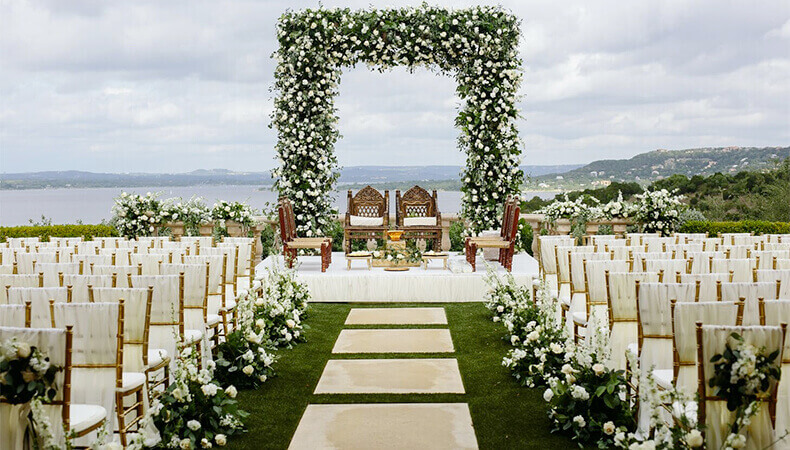Wedding planning is an exciting process and an incredible experience, but it does come with a handful of challenges and tricky decisions. One of the most pivotal decisions you and your intended will have to make when planning your big day is where the celebrations will happen. You’ll need to make sure you have enough space for both your guests and your vendors, including your photographer, wedding DJ and band, and your catering team. Will you find a romantic mountaintop venue in Montana or Colorado? A sunny beach in Hawaii or California? Or perhaps an iconic landmark in your hometown? There are plenty of classical and novel choices when choosing a wedding venue.
In this article, we’ll review some of the things you’ll need to think about when selecting a wedding venue and discuss some of the essential features that this space should offer. From the location of the ceremony and reception to the availability of your venue manager, there are many factors to consider in order to ensure that everything goes smoothly.
Choose Your Wedding Style
You probably already have some ideas about what kind of ceremony and reception you’d like to have for your big day. The first step towards selecting the right venue is simply putting these ideas down on paper to identify what kind of style your wedding should follow! Are you looking to hold a big party with a larger guest list? Or a smaller, more intimate wedding with just a few friends and family?
If you want a more traditional wedding, you’ll likely choose a completely different venue than someone looking to host something more outside the box. You’ll also want to consider the aesthetics of the decor options that fit each space, whether they match your personality, and the vibes you’re aiming for when planning.
Review What’s Included in Each Venue in Relation to Cost
Every wedding venue comes equipped with a unique range of services, add-on packages, and amenities. So before you get too scared of the higher price tag places, consider reviewing what’s included with the venue and how much these services are likely to cost if you’re purchasing them separately.
Many venues offer rental equipment- including everything from the A/V gear your wedding band or DJ will need to the silverware for the dinner- at no additional cost. However, that’s not always the case, which means you’ll always need to review the fine print in relation to the cost.
Indoor vs. Outdoor Venues
If you’re planning an outdoor wedding, there are a handful of extra venue features you should look out for before booking. The first and most important feature is the availability of a backup space in the event that it rains or that it’s too windy or cold. In addition, it’s usually a good idea to think about where the restrooms will be in relation to the main events, what kind of pest control options are available, and where you’ll get electricity for lights, speakers, and other key wedding equipment.
Why Location Matters
The location of your venue can play a major role in the logistical success of the event, particularly if you’re inviting more than a few guests who live in other states or countries. Think about where the venue is located in relation to the airport and train station, in addition to the travel times that will be required for these guests. If you’re booking a stay for you and your guests, you’ll also need to review how it will take to transit guests between their accommodations and the venue itself.
Research the Surrounding Area
If you’re booking a destination wedding, make sure you spend some time researching the area around the venue instead of just the venue itself. The nearby activities, landscapes, and attractions can significantly improve your experience. If you’re looking at a venue that’s in a remote mountain location, you’ll want to have hiking and other similar activities nearby. If you’re looking at a more urban area, you’ll want to consider what kind of restaurants and accommodations best fit your needs.
Consider Transportation and Parking
Hiring a shuttle service to get your guests between their accommodations and the wedding venue might be necessary, depending on where you’re planning to book. Parking- for both your guests and your vendors- is another essential consideration that’s easy to overlook. Usually, these types of details are included with your venue’s contract- there shouldn’t be any vague descriptions of what your venue can accommodate here.
Additional Space Requirements
Guests aren’t the only thing that will take up the venue’s floor space- your vendors also need room to operate. If you’re hiring a full wedding band, you’ll likely want to look out for a stage or other similar platform that offers enough space for drums, guitars, A/V tech, and other essential equipment items. If you hire a wedding DJ, you won’t need quite as much space, but it’s still important to factor them into your plans when mapping out the venue’s space. Your wedding photographer, planner, and catering team (if you’re hiring one) will also need to occupy some of the venue’s available space.
Meet With a Venue Manager Before Booking
Your venue’s manager should be transparent about all the facility’s services and easily accessible throughout your planning process. As your plans change, you’ll need to stay in touch to ensure everything runs as smoothly as possible.
Read the Online Reviews Carefully
While this might seem an obvious tip, it’s always important. Don’t get caught up in the venue’s photos- take a closer look at what the experience will look like by reading the reviews on WeddingWire and other similar booking platforms. Other guests’ experiences can give a good idea of what to prepare for when your big day arrives.








